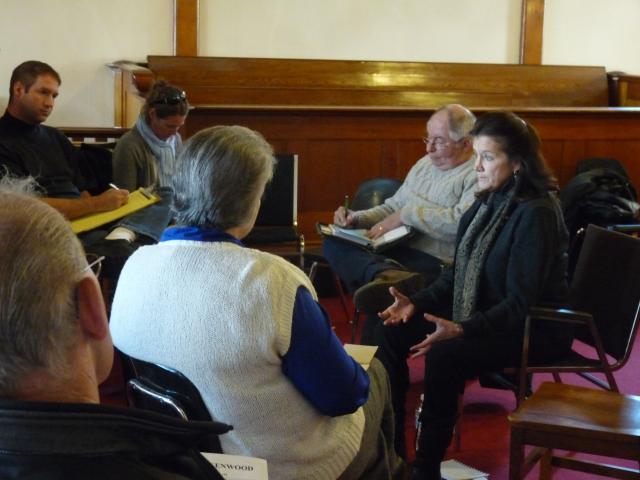Making Greenwood a memorable community
Making Greenwood a city that is not only liveable, but also memorable was the topic of a workshop last weekend with Lanie McMullin. McMullin, an economic development specialist in the areas of arts and culture, spent a couple of days in the Boundary giving presentations and assessing the potential for development. McMullin spoke twice Friday, Nov. 13 in Grand Forks, visited Christina Lake, and spent Saturday, Nov. 14, assessing the City of Greenwood as well as presenting to the public at a luncheon.
McMullin was brought to the region to talk about and provide suggestions for economic development and tourism. As the current Executive Director for Economic Development for the city of Everett, McMullin oversees all departments in an effort to revitalize, redevelop and advance the city’s economic viability. Additionally, McMullin is the Executive Director of the Everett Performing Arts Center.
McMullin was realistic with the groups she spoke to while highlighting six critical components to a successful community and four mistakes that will guarantee failure. For McMullin the number one on the list to attract people to move to and live in a community is to have a strong cultural presence.
“It’s always been a tool (using a thriving arts community to attract residents). But right now it becomes more and more important for cities who care about developing a work force,” said McMullin. “In the U.S. our workforce is now 53 per cent knowledge based. It used to be that jobs would be established around natural resources. Now, especially with technology, (these workers) can live anywhere they want. That means that the jobs move to the workforce.”
McMullin says that site selectors looking to relocate a business examine who it is that lives in the area as the potential available workforce as a critical factor in their decision to relocate. As a result, city developers need to attract the workforce first in order to attract businesses. And for McMullin, that means developing the arts.
“We are trying to develop cities based on what a knowledge based workforce would want to move to,” said McMullin. “As luck would have it, those are all things that you would like to have in your city too. But now they become the most important factor in a city being healthy and economically viable. And number one on the list is cultural presence.”
While McMullin did not provide instant answers for the region, she passed on a number of ideas to consider in future decision-making situations. She did address the need for the Boundary regional communities to work together for success.
“From my assessment that I am going to send back to you, it’s going to say this: when it comes to tourism and critical mass, you would all be a lot better off with combining all your efforts,” said McMullin. “There’s critical mass between you, but all alone you stand alone. If you combine your efforts and continue that partnership, your resources will go farther and people will find more critical mass for which to visit.”
Her assessment of Greenwood will be provided to the city at a later date. McMullin’s tour was sponsored by Community Futures Boundary, Selkirk College, and the City of Greenwood. While 20 people participated at the luncheon at Greenwood city hall, about 40 people attended her evening presentation in Grand Forks at the Grand Forks Art Gallery, and 23 people were at the luncheon for the Grand Forks District Credit Union board of directors and invited guests.
McMullin’s list of success and failure factors:
In the success category were:
• the presence of education for all ages;
• obvious philanthropic activity including volunteerism;
• community celebrations;
• a strong cultural presence;
• ethnic diversity;
• and the availability of gathering spaces such as parks, arenas, coffee houses, etc.
The kiss of death comes from four main areas:
• communications or lack of that creates explosive situations;
• a belief in the scarcity model – if you win, I lose;
• letting past experiences get in the way;
• and the attitude that new perspectives don’t work.























